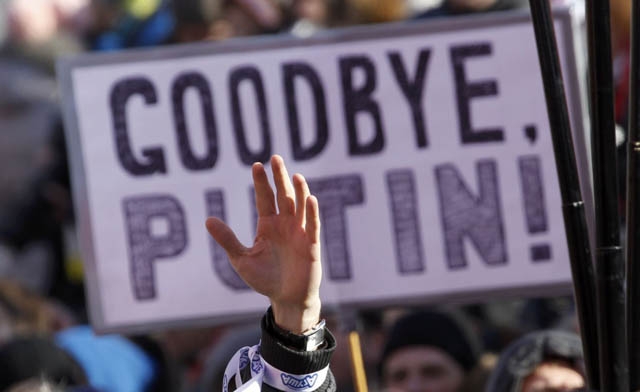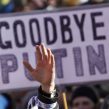
Dirty Elections Grant Putin Disappearing Power
Publication: Eurasia Daily Monitor Volume: 9 Issue: 55
By:

There were few reasons to expect that Vladimir Putin would show a generosity of heart after the moving-to-tears but dubious victory in the presidential elections two weeks ago. Grounds for concern about possible repressions against the opposition – portrayed as “traitors” – appeared more serious, but no “tightening of screws” has happened so far, while the smear campaign in the official TV has intensified (Moskovsky Komsomolets, Expert, March 17). What is happening these days resembles more a selective punishment. This has been exemplified by the court verdict that has sent back to jail entrepreneur Aleksei Kozlov, whose wife, journalist Olga Romanova, was one of the organizers of the protest rallies in Moscow (Novaya Gazeta, Kommersant-FM, March 17). This petty vindictiveness cannot put fear back into the tens of thousands of Muscovites who have discovered the joy of togetherness in the street actions, but it does generate new anger against the stagnating regime.
What accentuates this indignation is the conventional and senseless police brutality, which the authorities try to deny until it explodes in the Putin-free blogosphere. In February, the chief of St. Petersburg police was replaced after the outrage about the death of a teenager detained for alleged thievery (Fontanka.ru, February 29). Last week, a scandal exploded in Kazan, where a 53-year old man died after violent mistreatment in police detention, so prosecutors from Moscow were sent to investigate the crime (Kommersant, March 17). The chain of such “betrayals of duty,” as Interior Minister Rashid Nurgaliev has described it, proves that except for renaming the law enforcement structures as “police,” the reform accomplished under the watch of President Dmitri Medvedev has brought no improvements (Vedomosti, Nezavisimaya Gazeta, March 16).
The aim of that reform was not to camouflage the lack of law and order but to regain some control over the “enforcers,” who became too deeply involved in predation and racketeering, growing barely distinguishable from criminal organizations. The same goal is behind the campaign to curb corruption in the vast state bureaucracy that Medvedev is trying to advance in the final weeks of his failed presidency (Vedomosti, March 14). The legislation on monitoring not only the income but also the expenses of top- and mid-level nomenklatura members appears to make perfect sense but there are no “clean hands” in the thoroughly corrupt system of multiple controls that could be entrusted with checking the “voluntary” declarations (Lenta.ru, March 15). No leader could realistically hope to win a war against his own system of power. Even if Medvedev fears and Putin resents that the widening exasperation with corruption propels such fearless politicians as Aleksei Navalny, the duumvirate is not going to jeopardize any entrenched bureaucratic interests (Gazeta.ru, March 16).
This helplessness to correct the most glaring fault in the system of governance and to address the problem that is seen by the society as crucial condemns Putin’s new presidency to failure even before it started. The most urgent tasks pertain to the stagnating economy, and the team of experts gathered on Putin’s instruction a year ago presented last week a new version of “Strategy 2020,” which contains a coherent plan for reforms (Moskovskie Novosti, March 16). The implementation of such measures as reducing the tax burden and privatizing the state-controlled corporations that should be split into functional parts could indeed help Russia to improve the investment climate – the aim that Putin himself has set emphatically in electoral speeches and publications (Vedomosti, January 30). His capacity for executing such reforms is, however, extremely low because of the promises given to his core electoral base – the bureaucracy and the “proletariat” employed in the old industrial sectors, particularly armaments producing plants (Newsru.com, March 16). The money, therefore, continues to run out of the country, and the deficit of the federal budget for the first two months of 2012 reached 3 percent of GDP, even though the government had expected a positive balance (Lenta.ru, March 16). Contrary to all the talk about an “innovative economy,” Russia is more dependent than ever on the extra-high oil prices, while Putin’s heavy-handed “manual management” of the gas sector has forced European consumers to demand cuts in contract prices. Gazprom’s operational expenses, however, move only up (RBC Daily, March 7).
It is not only in reforms but also in cadre selection that Putin’s freedom to choose is severely restricted, so the old hats of Sergei Ivanov and Igor Sechin continue to hang in the key offices; even the deeply unpopular Minister of Healthcare Tatyana Golikova has apparently secured her re-appointment (Kommersant, March 17). Medvedev perhaps understands better the need to refresh the government lineup, but Putin firmly overrules his choices (Nezavisimaya Gazeta, March 12). As a political leader, Medvedev has lost all credibility, but as the prime minister-designate with expressed presidential ambitions he could have had plenty of bureaucratic leverage, so Putin finds particular pleasure in cutting him down to size again and again. That might appear to strengthen his omnipotence in making all the key decisions but, in fact, it traps him in the position of a guarantor of the fast-deteriorating status quo.
Putin hardly has a clue about what to do with his hard- and ugly-won presidency except to protect it from real erosion of legitimacy and imagined conspiracies. He used to represent a “Teflon” leadership – his blunders always being somebody else’s fault – but now every misstep is amplified and even the sensible steps become faults because nobody trusts his judgment. He prevailed over the preferences of “modernizers” in the government, over the interests of investors in Russia’s future among the business elite, and over the pronounced disgust in the emboldened intelligentsia. He may soon find himself as isolated and despised as Tsar Nikolai II did exactly 95 years ago when he signed the fateful abdication letter (New Times, March 12). Exercising power without any responsibility used to be a great joy for the accidental ruler who has never grown above the mindset of a KGB Lieutenant-Colonel but developed a taste for the high life. That joy is now gone and a constant irritation bodes ill for the quality of Putin’s leadership.




